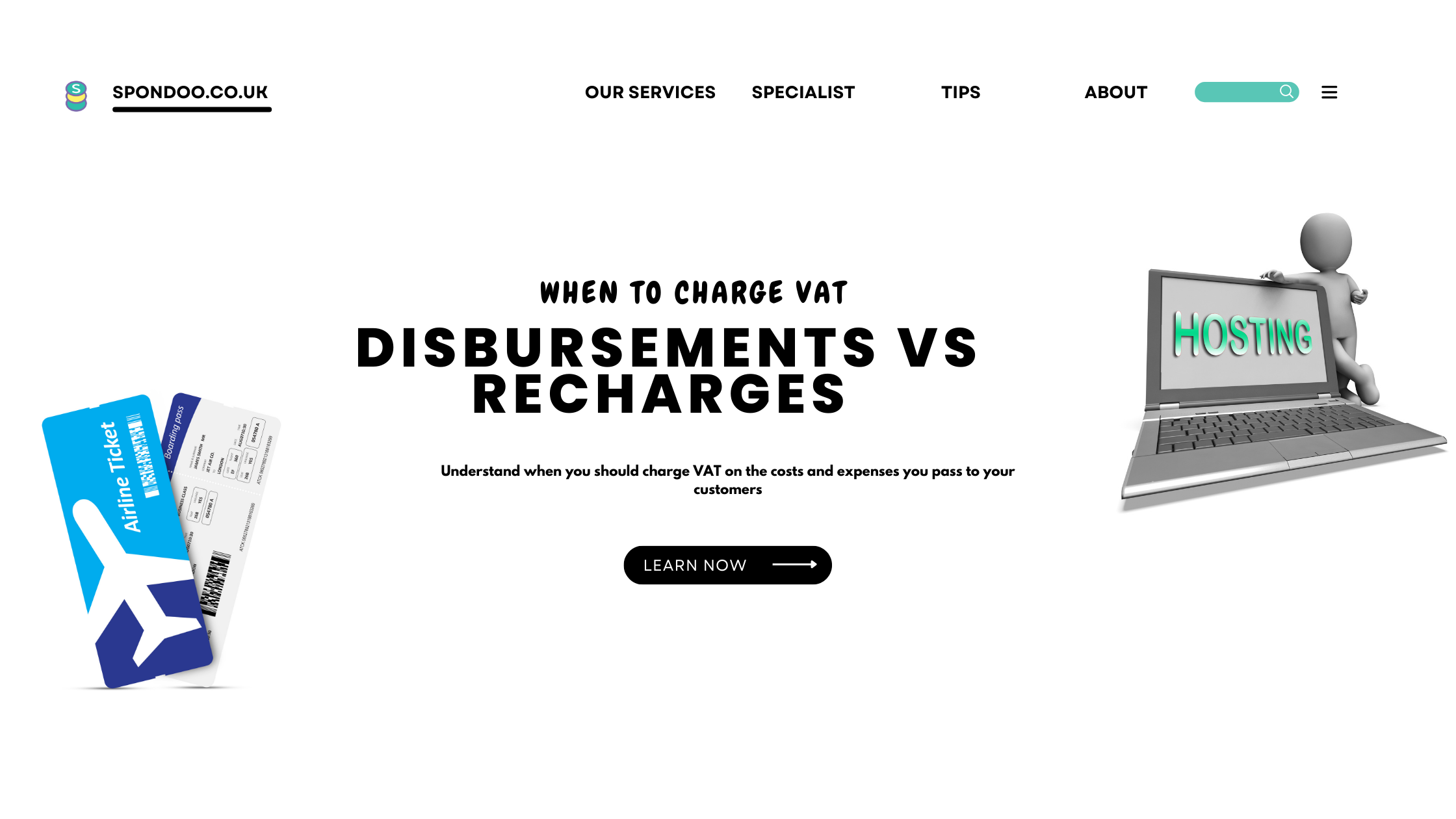
As a VAT-registered small business owner, you may incur some costs when providing a service to your client. If you have agreed with your customer that you will pass those costs to them on your invoice, it is crucial to understand the difference between disbursements and recharged expenses.
To make everything clearer, we have created this guide to help you understand when payments like these can be treated as disbursements or recharges - and when you should charge VAT on the costs and expenses you pass to your customers.
A disbursement is a payment made by a business on behalf of their customers, for goods or services received and used by the customer. In other words, it is the payment you make to suppliers on behalf of your customer (as an agent), but the cost will be passed on to your customers when you invoice them.
As these costs relate to your client’s business, you cannot claim back any VAT on them or charge VAT on them when invoicing your customer. If your customer wants to reclaim the VAT on the cost, you will provide them with an invoice in the name of their business.
To ensure there are no VAT problems in relation to disbursements charges, your disbursement cost must meet all the following conditions:
Examples of disbursements include:
Quick Point- disbursements are also excluded from your taxable turnover when computing your revenue in line with the mandatory VAT registration threshold.
Recharge is a cost that your business incurs in the provision of your goods or services to your customers and are deemed to form part of your overall service.
These costs should be invoiced to customers including VAT on sales invoices – whether you paid VAT on them or not.
Some HMRC examples of recharge expenses include:
The treatment of disbursements and recharged expenses is a common cause of VAT errors. To avoid falling into VAT pitfalls, it is important to remember:
You must itemise disbursements separately on your VAT invoice if you exclude them from the VAT calculations.
Garry, a funeral agent based in Edinburgh, does three-day work for a client in London. He visits the client’s premises to discuss the project and stays in a hotel. Garry also agrees to purchase flowers from a different flower provider on behalf of the client.
The consultant and the client agree on the following fees:
Activity | Fee |
| Agent’s work
| £3,000 plus VAT |
| Three-night hotel costs
| £600 plus VAT |
| Agent’s travelling expenses
| £300 plus VAT |
| Flowers bought on the client’s behalf
| £100 |
The invoice would include something like this:
Description | Rate | Net Amount | VAT(20%) | Gross amount |
| Three days business Consultancy
| £1000 per day | £3000 | £600 | £3600 |
| Three-night hotel costs (Recharged expense)
| £200 per day | £600 | £120 | £720 |
| Agent’s travelling expenses (Recharged expense)
| £300 | £60 | £360 | |
| 2 Funeral flowers arrangement (Disbursement)
| £100 per flower arrangement | £200 | N/A | £200 |
| Total
| £4100 | £780 | £4880 |
The £600 hotel stay costs and £300 travel expenses that Garry recharges to the client are not a disbursement, so he must charge VAT on them. However, the cost of the flower arrangement is a disbursement and can be excluded from the VAT calculation.
You can claim back any VAT you incurred on items supplied to your business, even if you passed these costs on to your customers as recharges. Your VAT-registered customers can also claim back the VAT you charged them.
However, you cannot claim the VAT back if the goods or services were supplied to your customer, and you treated this as a disbursement when you invoiced your customer and did not charge VAT. Your customer may also be unable to claim back the VAT if they don’t have a valid VAT invoice for the goods or services.
It is worth bearing in mind that to claim back the VAT on costs and expenses passed to your clients as recharges, you will need a valid VAT invoice or receipt.
It is important to keep evidence - If you pass on any disbursements to your customers. You may keep order forms and invoices to show HMRC that you were entitled to leave the items out of the VAT calculation when you invoiced your customers.
If you still have questions on the difference between recharge expenses and disbursements, and when you should charge VAT on the costs, contact us for clarification.
